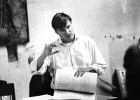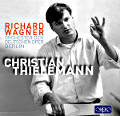ORFEO International – Catalogue
CDs
Richard Wagner
How time flies: it’s already thirteen years since Christian Thielemann made his celebrated debut on the Green Hill of Bayreuth with The Mastersingers in the year 2000. The notion that this work – which Wagner had not conceived for the acoustic of Bayreuth – could in all its counterpoint be made to sound so transparent in the Festspielhaus was an experience that was astonishing and enthralling to audiences and press alike. 
Christian Thielemann
Foto: KranichphotoIn Beethoven’s Ninth Symphony and in Parsifal just a year later (when he stepped in at short notice) he confirmed the prevailing impression that there was hardly another conductor today with such a natural approach to Wagner’s oeuvre and to the special challenges of each and every one of his music dramas. Thielemann exuded a sense of commanding calmness, and yet the music flowed under his baton in a manner that afforded the singers the musical space to breathe. By the time of his Tannhäuser première in 2002, Thielemann was finally able to make his own mark (not least thanks to his having been co-responsible for choosing the soloists). He prepared and conducted the Ring that ran from 2006 to 2010, and last year added the Flying Dutchman too. Thus he has covered the whole of the Bayreuth canon there, with the exception of Lohengrin and Tristan – though it hardly needs mentioning that he has often enough made a stir with these same two works outside Bayreuth. As, for example, with Lohengrin at his newest musical “home”, the Semper Opera, where he is the Chief Conductor of the Staatskapelle Dresden. 
C 879 132 IIn his native city of Berlin, where he was General Music Director at the Deutsche Oper from 1997 until 2004, he conducted all the works of the Bayreuth canon, beginning with Tristan (a work that was in fact crucial to his international success). He also conducted Tristan in Hamburg and Nuremberg (where he had his first position as General Music Director), in Bologna and at the Vienna State Opera. The Musikverein in Vienna was the venue of his concert with the orchestra of the Deutsche Oper in 2004 that is now being released on CD by Orfeo. It offers more than just an “interim report” on Thielemann’s already profound understanding of Wagner. The preludes to Lohengrin and Tristan were on the programme as well as the “Liebestod” from the latter and the Good Friday Music from Parsifal. The fact that the vocal parts were absent was more than made up for by the immense spectrum of orchestral colours on offer. Already in his collaboration with the orchestra of the Deutsche Oper, Thielemann had cultivated a characteristic blend of sound that allowed him to bring an intense luminosity and radiance to the great operatic and symphonic repertoire beyond Wagner, stretching to Beethoven, Marschner, Bruckner, Pfitzner and Strauss. For this same reason, interludes such as “Siegfried’s Rhine Journey” or the Funeral March from Götterdämmerung, despite all their latent bombast, never sound bulky or coarse under Thielemann (whether in the opera house or the concert hall). Similarly, the Tannhäuser Overture and the prelude to The Mastersingers (as already mentioned above with regard to Thielemann’s Bayreuth activities) are enlivened by Thielemann’s careful attention to the musical structure and the voice-leading in the orchestra, but above all by his irrepressible joy in dynamic intensification, from the finest pianissimo to the mightiest fortissimo, as also in overpowering tempo shifts and rubato effects. They remain an integral part of the overall musical context. Even the somewhat superficially effective overture to Rienzi is remarkable for its verve and subtlety. The decision to place this five-act opera on Bayreuth’s additional programme under Thielemann in the summer of 2013 seems all the more sensible in the light of his performance of the overture in Vienna. Who else, if not Thielemann, could offer a positive overall impression of this grand opera?
|